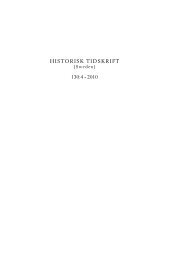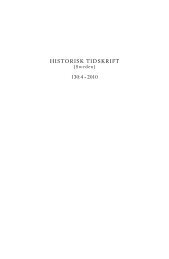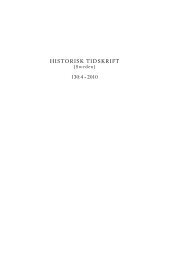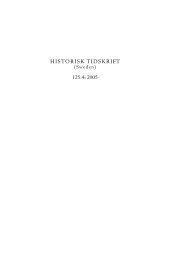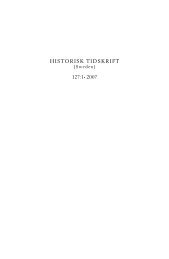Dahlqvist, "Folkhemsbegreppet: Rudolf Kjellén vs ... - Historisk Tidskrift
Dahlqvist, "Folkhemsbegreppet: Rudolf Kjellén vs ... - Historisk Tidskrift
Dahlqvist, "Folkhemsbegreppet: Rudolf Kjellén vs ... - Historisk Tidskrift
You also want an ePaper? Increase the reach of your titles
YUMPU automatically turns print PDFs into web optimized ePapers that Google loves.
444 Lena Berggren<br />
national variants, it is still a significant piece in the jig-saw puzzle of formulating<br />
a generic ideal-type concept of fascism, a concept which aims towards a fuller<br />
understanding of fascism as a relatively coherent political ideology with its own<br />
core myth rather than a paradoxical and manichean terror system. Shifting the<br />
focus from the giants of Fascist Italy and nazi Germany also underlines the fact<br />
that fascism is a general western phenomenon, not a Sonderweg development in<br />
just a few countries.<br />
There is no doubt that fascism in Sweden failed immensely in its ambitions to<br />
build a mass mobilising political movement. The only moment in time during the<br />
interwar period when the socio-economic crisis was so severe that there might<br />
have been a chance for a fascist movement to gain real momentum, in connection<br />
with the severe hunger demonstrations in 1918–1919, there were no fascists present<br />
to take advantage of the situation. And when the Depression hit the country<br />
in the early 1930s, the organised fascists failed to turn this in their own favour.<br />
The reasons for this can be found within the fascist movement itself as well as<br />
without it, but to use this fact to dismiss fascism altogether, as ideologically as<br />
well as organisationally insignificant, is jumping to conclusions.<br />
In the 1930s, practically every conceivable barrier against the growth of fascism<br />
of a more practical, socio-economic character was in place, and it thus<br />
seems rather paradoxical that Sweden should have had a fascist movement in the<br />
first place. Despite this, Sweden had a relatively strong fascist movement,<br />
peaking in the mid-1930s at around 30,000 members out of a population of 6,5<br />
million. There must be reasons for this, but so far we know very little about this.<br />
The conclusion that can be drawn from this, which also concludes this article, is<br />
that more research both into Swedish interwar fascism as such and into its<br />
indigenous context is needed.<br />
Debatt<br />
<strong>Folkhemsbegreppet</strong>:<br />
<strong>Rudolf</strong> <strong>Kjellén</strong> <strong>vs</strong> Per Albin Hansson<br />
Av Hans <strong>Dahlqvist</strong><br />
Introduktion<br />
Begrepp kan svårligen analyseras för sig själva. Ett och samma begrepp har olika<br />
betydelser beroende på vem som använder det. Det är till exempel troligt att en<br />
moderat och en socialdemokrat menar olika saker när de talar om rättvisa, och<br />
att begreppet död har olika innebörd för ateisten och den kristne.<br />
Begreppshistorikern Reinhart Koselleck har betonat att begrepp formas i ett<br />
politisk-socialt system. Språket blir därmed ett viktigt redskap i kampen om<br />
den politiska arenan, den offentliga debatten och tolkningsföreträdet till vissa<br />
centrala begrepp. 1 Bo Stråth har poängterat följande utifrån Kosellecks teorier:<br />
Genom att det finns enighet om begreppen som sådana håller de samman<br />
samhället, men genom att det samtidigt råder oenighet om deras innebörd<br />
blir de utgångspunkten för politisk strid. 2<br />
Det förefaller följaktligen rimligt att säga att begrepp inte har någon mening<br />
utan en aktör. Det som ger mening åt ett begrepp är förståelsen av vad aktören<br />
vill ha sagt, förståelsen av aktörens intentioner. För att nå denna förståelse<br />
behöver aktören sättas in i sin tidsbundna kontext. I vilket sammanhang<br />
används det aktuella begreppet? Vilka omständigheter omgärdar begreppsanvändningen?<br />
Vilka referensramar hade aktören ifråga? 3<br />
Uppfattningen att ett begrepps betydelse varierar beroende på vem som<br />
använder det kan möjligen tyckas självklar. Lika fullt uppstår det ibland en<br />
till synes märklig begreppsförvirring. Ett sådant exempel gäller folkhemsbegreppet.<br />
Traditionellt har Per Albin Hansson (1885–1946) framställts som<br />
1. Reinhart Koselleck, Futures Past, Cambridge 1985, s 73–80.<br />
2. Bo Stråth, Mellan två fonder. LO och den svenska modellen, Stockholm 1998, s 26.<br />
3. Resonemanget bygger på Quentin Skinners begreppshistoriska teori/metod. Se Skinner i Meaning<br />
and Context: Quentin Skinner and His Critics, Princeton 1988, samt Skinner i Political Innovation and<br />
Conceptual Change, Cambridge 1989. För vidare läsning om Skinner se t ex Jacob Westberg, ”När ord får<br />
mening”, i <strong>Historisk</strong> tidskrift 1998:2, s 163ff.






